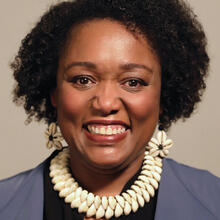Having a bad experience in the confessional probably is not unusual, but it is probably not the norm, either. In other words, out of all the good experiences one may have had confessing one’s sins, there is probably at least one experience that went poorly.
I talked about a bad experience from my childhood on a recent episode of “The Gloria Purvis Podcast.” The priest was young and from another country. He did not know the context of my family life. I was the sole Catholic in my family, and a family situation prevented my attending Mass one Sunday. I couldn’t drive, and we lived too far from any parish for me to walk there. Plus, we had no advance knowledge that this family situation would arise. He did not ask me any questions to get a better understanding of my situation.
Having a bad experience in the confessional probably is not unusual, but it is probably not the norm, either.
In retrospect, I am sure he assumed I was in a family of Catholics and lived within walking distance of a church. He assumed I did not take my Sunday obligation seriously. Why else would he refuse to absolve me?
But as a child, I did not know what to do. Was I hell-bound since I had this unforgiven sin staining my soul? How would I continue to practice my faith? I did not tell my parents because they were not Catholic, and I did not think they were supposed to know. What could they do anyway? They did not understand the sacrament of reconciliation or the meaning of absolution or the priest’s role in the sacrament.
So, what did I do? I did not receive the Eucharist for a very long time. I cannot recall if it was months or years. I still attended Mass because I had committed to being Catholic and knew it was my obligation to God. I still loved God. I assumed he still loved me, but I was heavily burdened by the priest’s refusing to give me absolution. He was relaxed and calm when he said he would not forgive me for missing Mass. He had no care or concern whatsoever. I still recall his nonchalance. I do not know where the priest ended up after his short-term assignment at my parish. I never even learned his name.
[Sex and Confession: 5 helpful guidelines]
I never again encountered that priest in the confessional. I also continued to go to confession. Why? Because I know God is present there, and I love him. The times when I chose to rebel against him brought me great sadness and regret. I wanted to reconcile with him. I needed his help to resist temptation. Leaving the faith was never a consideration for me. I believed Jesus was present in the sacraments. To whom would I go when I believed the Catholic Church was founded by Jesus Christ (Mt 16:18)? My will was firm.
Unsure about the state of my soul, I meekly asked a confessor, while confessing other sins, if I could be forgiven for this past sin. I told him about what happened with the other priest. I could hear him exhale behind the screen. He said firmly and lovingly, “My child, you are forgiven.” He gave me absolution. I started receiving the Eucharist again.
You are not alone in your bad experience in confession, and you can do something to heal from that trial.
Knowing many others have had poor experiences in the confessional, I spoke with Jim McDermott, S.J., an associate editor at America, to explore what penitents can do if they have a bad experience or sense something is awry while confessing. We discuss what confession is, how he was trained to hear confessions, how hearing confessions has impacted him, his bad experience as a penitent and why we should keep going to the sacrament.
You are not alone in your bad experience in confession, and you can do something to heal from that trial. I hope this episode provides some consolation.








